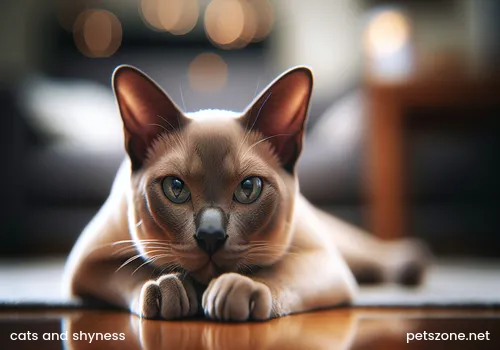Can Cats Understand Their Owner's Shy Behavior_ Revealing Cats' True Reactions to Human Embarrassing Moments
Whether cats can understand their owner’s shy behavior and their true reactions to human embarrassing moments is a question that many “pet parents” are curious about. Simply put, cats may not be able to grasp complex social emotions like “shyness” in the same way humans do, but they are very skilled at observing and interpreting human body language, voice, and facial expressions, and they adjust their behavior based on these signals.

Although we cannot conclude that cats understand complex emotions like “embarrassment” or “shame,” as these require higher self-awareness and the ability to comprehend others’ perspectives, scientists are still uncertain whether cats possess these cognitive capabilities. However, research shows that cats can perceive basic human emotions such as happiness, fear, anger, and sadness. They may judge your emotional state by observing your changing facial expressions (such as smiling or frowning), listening to the tone of your voice, and watching your bodily movements.
Possible Reactions of Cats to Human Embarrassing Moments
When owners display behavior resembling embarrassment, such as accidentally falling, spilling something, or saying something silly, cats may exhibit the following reactions:
- Curious Observation: Cats may pause, tilt their heads, and look at you as if observing what happened. This behavior mainly stems from their alertness and exploratory instinct towards sudden changes in their environment.
- Quick “Escape”: If your “embarrassment” is accompanied by loud noises, sudden movements, or negative emotions (such as feeling frustrated or angry due to embarrassment), cats might feel uneasy and choose to hide or walk away to avoid potential “dangers” or unpleasantness.
- Attempting to Comfort (possibly unconsciously): Some cats become more clingy when their owners feel down or unhappy, rubbing against you, purring, or sitting on your lap. They may not understand your embarrassment but sense your negative emotions and try to make you feel better by getting close, or they might seek comfort themselves because your gloom increases their own unease. This is somewhat like children trying to soothe adults who are upset, possibly a learned or mimicked behavior.
- Indifference: Another possibility is that cats show no obvious reaction to your embarrassing behavior and continue with their own activities, such as sleeping, grooming, or playing. This does not mean they do not care about you, but rather that they do not interpret your behavior as a signal requiring special response, or your emotional changes are not strong enough to catch their attention.
Why Can Cats Perceive Human Emotions but Possibly Cannot Understand “Embarrassment”?
This involves animals’ “Theory of Mind” ability. Theory of Mind refers to the capacity to understand that oneself and others have independent and different thoughts, beliefs, intentions, and emotions. Although some studies suggest that many animals, including chimpanzees, elephants, dolphins, and corvids, may possess a degree of Theory of Mind, research on cats in this regard is still at an early stage. Understanding “embarrassment” requires the individual to be aware not only of their own behavior but also to comprehend that such behavior might trigger negative judgments from others in social contexts. This is a more complex cognitive process, likely beyond the current assumed capabilities of cats.
However, this does not mean cats are completely insensitive to human emotions. They may learn to associate certain behaviors, sounds, or expressions with specific outcomes. For example, they might have learned that when their owner smiles, there are usually treats or pets, and when the owner is angry, they might be scolded or ignored. This experience-based learning and pattern recognition enable cats to respond to human emotional changes even if they do not fully understand the deeper meanings behind these emotions.
Comparison of Cats’ Intelligence with Human Children
Scientific research shows that the intelligence of adult cats roughly corresponds to that of 2 to 3-year-old human children. They have the ability to solve simple problems, remember important people, events, or places, and respond to their owner’s emotions. The structure and surface folding of cats’ brains are about 90% similar to those of humans, although the number of neurons is far fewer. They excel at observational learning, such as opening doors or using certain objects. Cats also have good short-term and long-term memory, able to recall emotional experiences associated with a place or event in the past.
Localized Perspective: Observations from Chinese “Pet Parents”
In China, cats are becoming increasingly popular as pets, and “pet parents” have accumulated rich experience interacting with them. Many people use playful sayings to describe cats’ “aloofness” or “grudges,” such as “Cats understand their names, they just don’t want to pay attention to you” or “Cats don’t feel guilty, they just remember how you look when angry and continue causing trouble next time.” Although these are anthropomorphic interpretations of cat behavior, they also indirectly reflect cats’ ability to perceive human emotional changes and adjust behavior based on experience. After all, who hasn’t had an embarrassing moment in front of a cat only to have it calmly glance at you as if saying, “Silly human”?
Summary
In short, although cats may not experience complex social emotions like “shyness” or “embarrassment” as we do, they are keen observers capable of perceiving basic human emotional changes and adjusting their behavior accordingly. Their reactions during your embarrassing moments are more about exploring unusual environmental situations, avoiding negative emotions, or seeking closeness than understanding your internal embarrassment. Understanding cats’ cognitive abilities and emotional expression helps us better coexist with these “troublesome little demons” and build more harmonious relationships.
Frequently Asked Questions
- Can cats really understand human emotions?
Research shows cats can recognize and respond to basic human emotions such as happiness, sadness, fear, and anger, mainly by observing facial expressions, listening to voice tones, and reading body language. - Do cats feel shame or guilt?
Scientists are currently unsure whether cats possess complex secondary emotions like shame or guilt, which require high self-awareness and understanding of social norms. - Do cats laugh at me when I embarrass myself?
Cats cannot understand “laughing at” as humans do; they may feel confused or uneasy hearing your laughter caused by embarrassment since it might sound different than usual. - Are cats’ reactions to embarrassment innate or learned?
Cats’ responses to human emotional signals may be partly innate (e.g., startled by loud noises) but are mostly formed through long-term interaction and observational learning with their owners. They remember what emotional responses bring certain outcomes in specific situations.
Through scientific research and everyday observation, we can gain deeper insight into cats’ inner world. Although they might not fully “understand” all our emotions, this does not prevent us from forming strong emotional bonds with these adorable furry companions.



